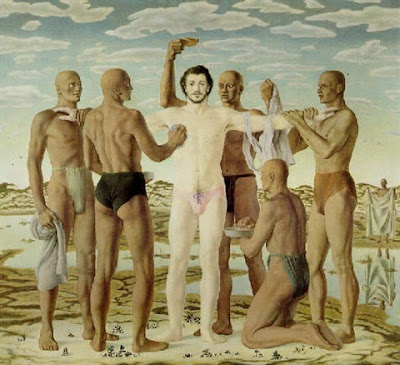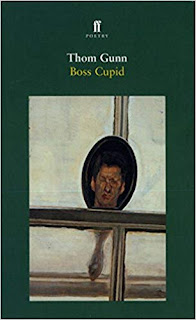Soho, Richard Scott.
Richard Scott’s Soho is an exuberant, poetic cornucopia,
a horn-of-plenty, over-spilling with erotic similes and metaphors.
& lovage boys were my
crops my ripe-red yield
my seeds each one exploding
onto my lips like and sherbet… [.]
(le jardin secret).
Scott writes
enthusiastically about writing the word “cock”, in an Ambit review on gay poetry. For him, it is a political act: a
“filthy shout” of defiance that sticks out from the page. This is where Soho starts.
In the first poem, a reader
is asked to imagine a 17-18 year old Scott, as he sits in a public library, in
1998, making a political gesture. He reads through Palgrave's "Golden Treasury
of Verse" and humorously adds sexual graffiti to its pages. He starts with
a marginal entry: “COCK”. Reviewers have loved the bravado here and in doing so
have been deflected from paying attention to the poem and a key question: How biographically
true is it? Critics admire Scott for his confessional vulnerability— which
becomes something else when the poetry is stage-managed.
In the library where there is not one gay poem,
not even Cavafy eyeing his grappa-sozzled lads— I
open again the Golden Treasury of Verse and write… [.]
There is something all too
knowing in the tone. Scott’s “grappa-sozzled lads” is a comical line, modern
and dissonant, but how apposite is it as an image? Cavafy’s homoeroticism is
Greek, melancholic after the event, fragranced by the wine-dark sea and
history. It has little to do with drunkenness and lads drinking Italian brandy.
The witticism isn’t quite as clever as Scott believes. It feels like a line
that works well in performance, but sits awkwardly on the page as a reader
reflects on what is being said.
There is something odd too
about this particular edition of Palgrave read by Scott. It contains Larkin
(b.1922) who could not have been in the "Golden Treasury of Verse"
that was despised by Pound and Modernism for its out-of-date Victorian
sentiments. Of course, the volume that Scott has in mind is the 1994 re-print
of Palgrave's work, which brought the anthology up-to-date. And here problems
of veracity begin. Scott quotes Hopkins, "tongue true and vaunt", and
relates ecstatically how he finally found a queer subtext (oral sex) in
Hopkin's "The Bugler's First Communion". That is miraculous indeed
for the poem does not occur in the "Golden Treasury" of 1994.
Furthermore, Scott's states (with eyes rolling in disbelief) that "In the
library... there is not one obvious gay poem." How odd, because in the
volume that Scott is reading there is a Shakepeare sonnet to his male lover, a
poem by Gunn about two male lovers (from The
Man with Night Sweats) and a pithy lyric from Anne Stevenson where she
describes
Auden and Isherwood
Stalking glad boys in Berlin.
How are these missed? Scott's
poem concludes with an indelicate pun on "rimming" and another cliché
on come/cum: his wondrous interventions in the texts will
"illuminate" the matter for "readers-to-come." The poetry in
Soho is invariably reviewed as
confessional, when, in fact, it is a clever artifice.
Scott’s “ prize-winning “Crocodile”
does convince, its snappy, biting lines deal bravely and boldly with male rape.
But “Childhood” and “Fishmonger”, which deal with paedophilia, are forced
constructs. They are examples of what has been termed Scott’s
“faux-confessionalism”, a slippery term indeed— poetically and morally. In an article for The Poetry School, “How I did it”. Scott admits that his poem about
gay pornography, “Cover Boys”, is artificial: ”My poem isn’t true, but it is honest." This is a disconcerting line to take for it offers a reality that (as Scott confesses) was put together by Googling and has no connection to autobiography, to an interpretation of life events. Of course, every poem is a transmutation of life, but the Confessional mode, of all poetic styles, has to be rooted in a lived life, not in facts collected from the internet.
Soho is split into five parts— its library preface, Admission,
Verlaine in Soho, Shame and Soho. The second part is unevenly written. “Slav
boys will tell you” is a concrete poem, a mushroom that alludes to a cock, yet
again. The obvious, phallic joke is demeaning. Scott seems to have in mind the
“Slav boys” of gay pornography rather than the thoughtful gay poetry of Hamdija
Demirovic— a Slav boy at the time of writing his rich and experimental work.
“Public Toilets in Regent’s Park” is Gunn minus his frankness and sexual honesty. Verlaine in Soho updates the poet’s 1872-3
visit to London. In the fourth section, Scott provides helpful critical
signposts to Whitman, Doty, Socrates, Genet, Freud, Bersani, Sedgwick,
Foucault, Socrates, Hanson in case the reader might miss them. The bias towards
Theory rather than poets indicates the direction in which the writing
heads—Hanson’s essay on “Teaching Shame” in Gay
Shame. The final section, a Whitmanesque paean to Soho and gay history, is
the strongest of all the sections. Here, Scott writes with force and
virtuosity.
Robert Duncan in his
daring self-outing, “The Homosexual in Society”, objected to the term “gay”, to
its cheerful superficiality, to its willingness to overlook sorrow and the depths
of male identity. In Soho, Scott has faced
the darker depths of being gay and for that he must be commended. He has shown
the dense shadow that is also part of the rainbow flag. The problem with Soho is that its murkiness records shame,
and not much else, and not always honestly.





Comments